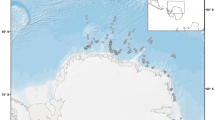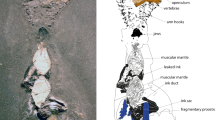Abstract
ON July 15, 1938, it was discovered that there Were large numbers of the barnacle Balanus improvisus Darwin, living on the stems of the reeds in Horsey Mere, Norfolk. The water of Horsey Mere and Hickling Broad has been very saline since the sea broke through last spring on February 12, March 1 and April 4, and estimations of the salinity of the surface Water on August 6, made by Mr. A. J. Rudd of the Norfolk Fishery Board, were: Horsey 18.19 per mille, Hickling varying from 21.0 per mille (north end) to 17.5 per mille (Whiteslea).
This is a preview of subscription content, access via your institution
Access options
Subscribe to this journal
Receive 51 print issues and online access
$199.00 per year
only $3.90 per issue
Buy this article
- Purchase on Springer Link
- Instant access to full article PDF
Prices may be subject to local taxes which are calculated during checkout
Similar content being viewed by others
References
Gurney, R., Trans. Norfolk and Norwich Nat. Hist. Soc., 7, 645 (1904).
Gurney, R., Trans. Norfolk and Norwich Nat. Hist. Soc., 8, 437 (1907).
v. Breemen, L., Zool. Anz., 105, 247–257 (1934).
Author information
Authors and Affiliations
Rights and permissions
About this article
Cite this article
HOLMES, P., PRYOR, M. Barnacles in Horsey Mere. Nature 142, 795–796 (1938). https://doi.org/10.1038/142795b0
Issue Date:
DOI: https://doi.org/10.1038/142795b0
Comments
By submitting a comment you agree to abide by our Terms and Community Guidelines. If you find something abusive or that does not comply with our terms or guidelines please flag it as inappropriate.



